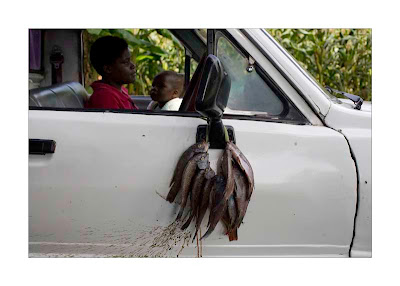
A story from Africa's creative spirit ...
A number of lakes and large rivers exist in Malawi.
Many people travel long distances by foot, bicycle, car, or minibus (a type of cheap, shared taxi) to pursue fish - a luxury and desired source of protein.
Nets and lines are used.
Let's just say the "bait" may be unique and colorful.
Sometimes, a quantity of fresh fish are caught and gathered in a bucket or basket.
The big challenge?
How can one get pounds of raw seafood home in the middle of day with high African heat and long distances to travel?
I am told fresh fish will spoil in just a few hours in Malawi if the fish are bundled up in a car or carried in a basket or bucket. The heat and muggy air will prevail.
Some of you may suggest an ice box as a solution.
Great idea. The only problem? Ice is rare and expensive to generate.
We need a quick, simple, low cost solution, a solution that does not require planning and equipment.
A ways back in time, an African somewhere on this vast continent discovered an elegant alternative to the modern ice box.
This solution involves a vehicle of some kind.
The slightly wealthier traveler, the fisherman with enough "coin" to jump in a mini-bus or the good fortune to be successful as a hitch hiker, may strap his/her "catch" to the mirror outside of the vehicle with a rope through the gill and mouth of each fish.
Then, when the vehicle moves along the dirt and paved roads, moisture from the fresh fish evaporates. And, due to the magic of physics, this evaporation causes cooling.
The faster the speed, the faster the evaporation and the greater the "cooling effect."
In this way, fish can be left, without ice or other sources of preservation, for hours in the deep heat of the day as the vehicle drives from an area near the lakes and rivers to the fisherman's home.
Yes, this approach also creates nutritional benefits - the addition of essential vitamins CO2 and road grit. Fortified fish.
When the fisherman arrives home, the need to scale, clean, and boil or fry the fish is immediate.
I am told, when consumed, "roadside preserved fish" maintains a new and slightly "altered" flavor.
It is clear the hygiene around this process may involve a certain degree of compromise. Yet, the fish make it home without spoiling. Clever.
As they say, "Necessity is the mother and father and grandparent of innovation!"

No comments:
Post a Comment